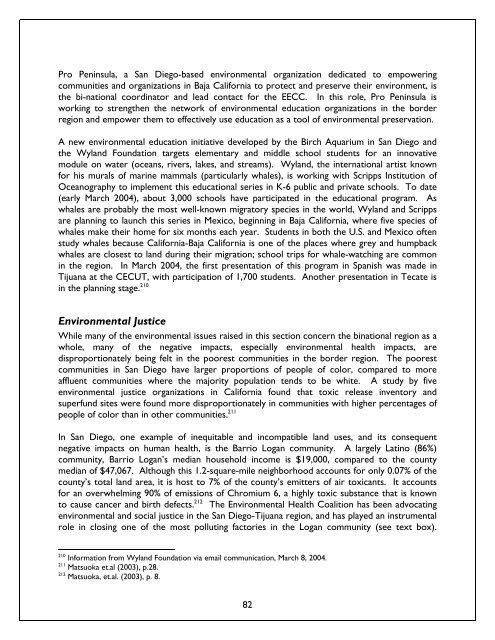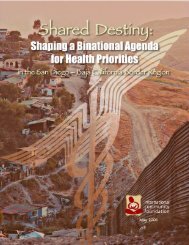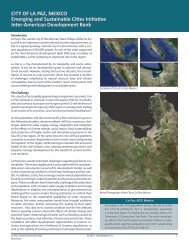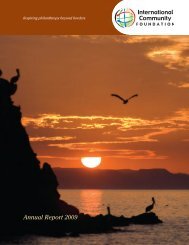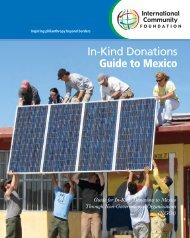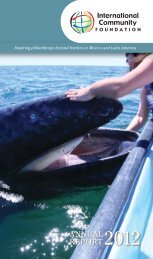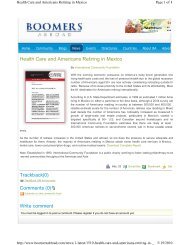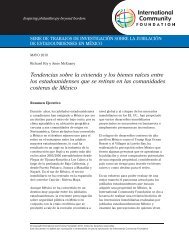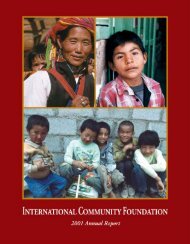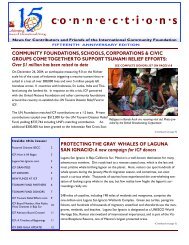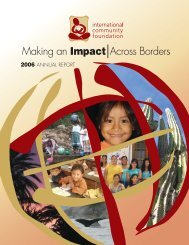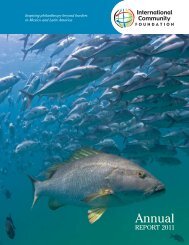Blurred Borders - International Community Foundation
Blurred Borders - International Community Foundation
Blurred Borders - International Community Foundation
Create successful ePaper yourself
Turn your PDF publications into a flip-book with our unique Google optimized e-Paper software.
Pro Peninsula, a San Diego-based environmental organization dedicated to empowering<br />
communities and organizations in Baja California to protect and preserve their environment, is<br />
the bi-national coordinator and lead contact for the EECC. In this role, Pro Peninsula is<br />
working to strengthen the network of environmental education organizations in the border<br />
region and empower them to effectively use education as a tool of environmental preservation.<br />
A new environmental education initiative developed by the Birch Aquarium in San Diego and<br />
the Wyland <strong>Foundation</strong> targets elementary and middle school students for an innovative<br />
module on water (oceans, rivers, lakes, and streams). Wyland, the international artist known<br />
for his murals of marine mammals (particularly whales), is working with Scripps Institution of<br />
Oceanography to implement this educational series in K-6 public and private schools. To date<br />
(early March 2004), about 3,000 schools have participated in the educational program. As<br />
whales are probably the most well-known migratory species in the world, Wyland and Scripps<br />
are planning to launch this series in Mexico, beginning in Baja California, where five species of<br />
whales make their home for six months each year. Students in both the U.S. and Mexico often<br />
study whales because California-Baja California is one of the places where grey and humpback<br />
whales are closest to land during their migration; school trips for whale-watching are common<br />
in the region. In March 2004, the first presentation of this program in Spanish was made in<br />
Tijuana at the CECUT, with participation of 1,700 students. Another presentation in Tecate is<br />
in the planning stage. 210<br />
Environmental Justice<br />
While many of the environmental issues raised in this section concern the binational region as a<br />
whole, many of the negative impacts, especially environmental health impacts, are<br />
disproportionately being felt in the poorest communities in the border region. The poorest<br />
communities in San Diego have larger proportions of people of color, compared to more<br />
affluent communities where the majority population tends to be white. A study by five<br />
environmental justice organizations in California found that toxic release inventory and<br />
superfund sites were found more disproportionately in communities with higher percentages of<br />
people of color than in other communities. 211<br />
In San Diego, one example of inequitable and incompatible land uses, and its consequent<br />
negative impacts on human health, is the Barrio Logan community. A largely Latino (86%)<br />
community, Barrio Logan’s median household income is $19,000, compared to the county<br />
median of $47,067. Although this 1.2-square-mile neighborhood accounts for only 0.07% of the<br />
county’s total land area, it is host to 7% of the county’s emitters of air toxicants. It accounts<br />
for an overwhelming 90% of emissions of Chromium 6, a highly toxic substance that is known<br />
to cause cancer and birth defects. 212 The Environmental Health Coalition has been advocating<br />
environmental and social justice in the San Diego-Tijuana region, and has played an instrumental<br />
role in closing one of the most polluting factories in the Logan community (see text box).<br />
210<br />
Information from Wyland <strong>Foundation</strong> via email communication, March 8, 2004.<br />
211<br />
Matsuoka et.al (2003), p.28.<br />
212<br />
Matsuoka, et.al. (2003), p. 8.<br />
82


